Key takeaways:
- Understanding personal motivation can involve reassessing one’s ‘why’ and the influence of environment on creativity and drive.
- Setting specific, measurable, attainable, relevant, and time-bound (SMART) goals leads to increased motivation and a sense of achievement.
- Building a supportive environment with positive relationships and engaging with like-minded individuals enhances motivation and accountability.
- Celebrating small wins creates a positive feedback loop, boosting commitment and motivation for future goals.
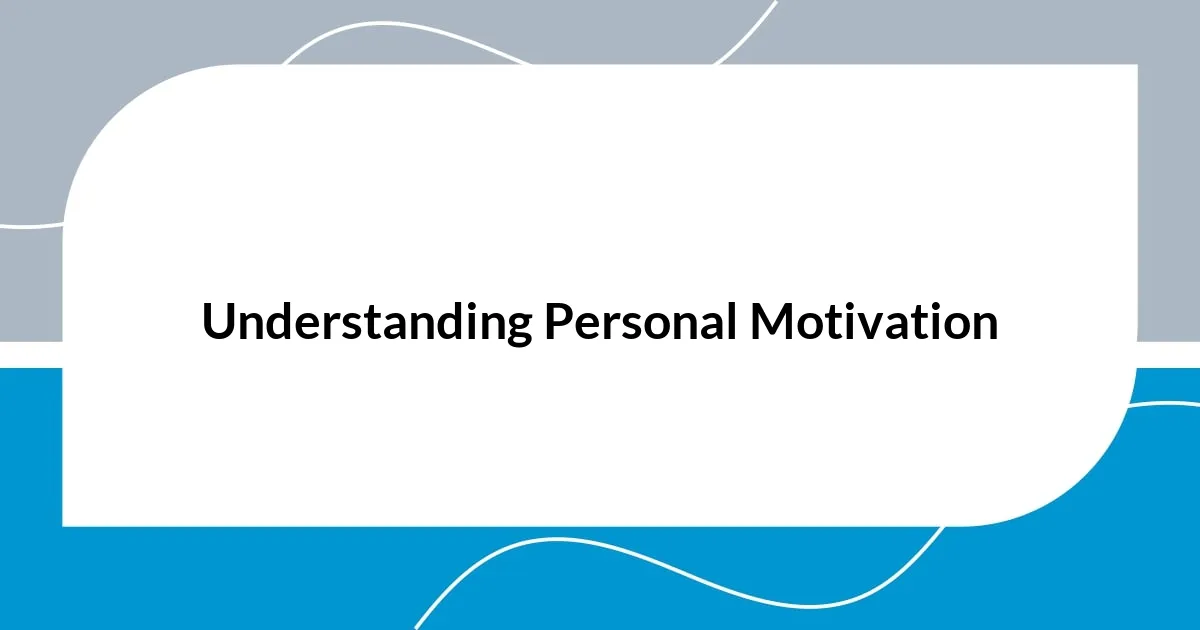
Understanding Personal Motivation
Understanding personal motivation is often about uncovering what truly drives us. For me, it’s that little spark of excitement I feel when I start a new project or hobby. Have you ever noticed how envisioning the end goal can ignite a fire within you? That anticipation can sometimes be enough to propel me forward, even on tough days.
Motivation can be deeply personal and often fluctuates based on our circumstances and mental state. I remember a time when I felt utterly uninspired while working on a long-term goal. It was only when I took a step back and reassessed my ‘why’ that I found clarity again. Why do we sometimes lose sight of what motivated us in the first place, and how can understanding that help us reconnect with our passions?
In my experience, environment plays a crucial role in fostering motivation. A cluttered desk can dim my enthusiasm, while a well-organized space can stir my creativity. Have you ever felt a rush of energy when you entered a room that inspired you? It’s fascinating how different settings can either uplift or drain our motivation, reminding me of the importance of surrounding myself with positivity and inspiration.
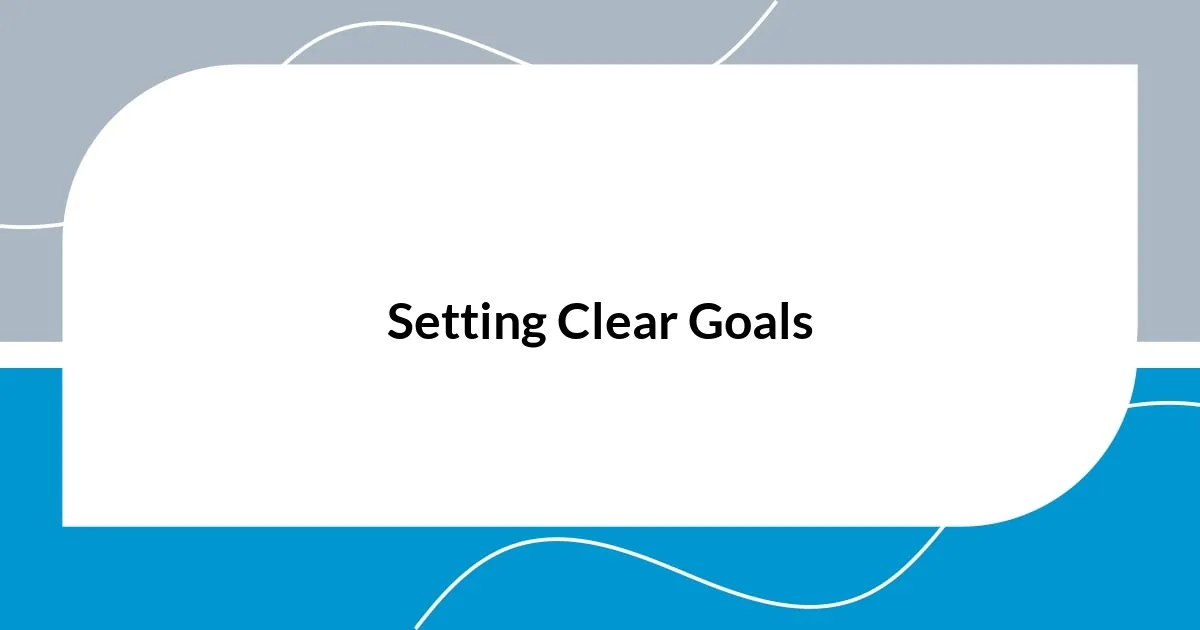
Setting Clear Goals
Setting clear goals has been a game-changer in my pursuit of motivation. I recall a time when I set a vague, elusive goal of “getting fit.” It felt daunting and unattainable, with no discernible path to follow. When I switched to specific targets, like “run a 5k in three months,” everything changed. Suddenly, I had a clear roadmap. Each small victory along the way—like hitting my distance milestones—fuelled my motivation and gave me a sense of achievement I hadn’t experienced before.
When establishing clear goals, I find it helpful to keep the following points in mind:
- Be Specific: Instead of “I want to improve my writing,” aim for “I will write 500 words every day.”
- Set Measurable Benchmarks: Create milestones to track progress, like completing a module in an online course weekly.
- Be Realistic: Choose goals that challenge you but are attainable, reflecting your current capabilities and resources.
- Time-Bound: Assign deadlines to your goals, as this establishes a sense of urgency that keeps me on track.
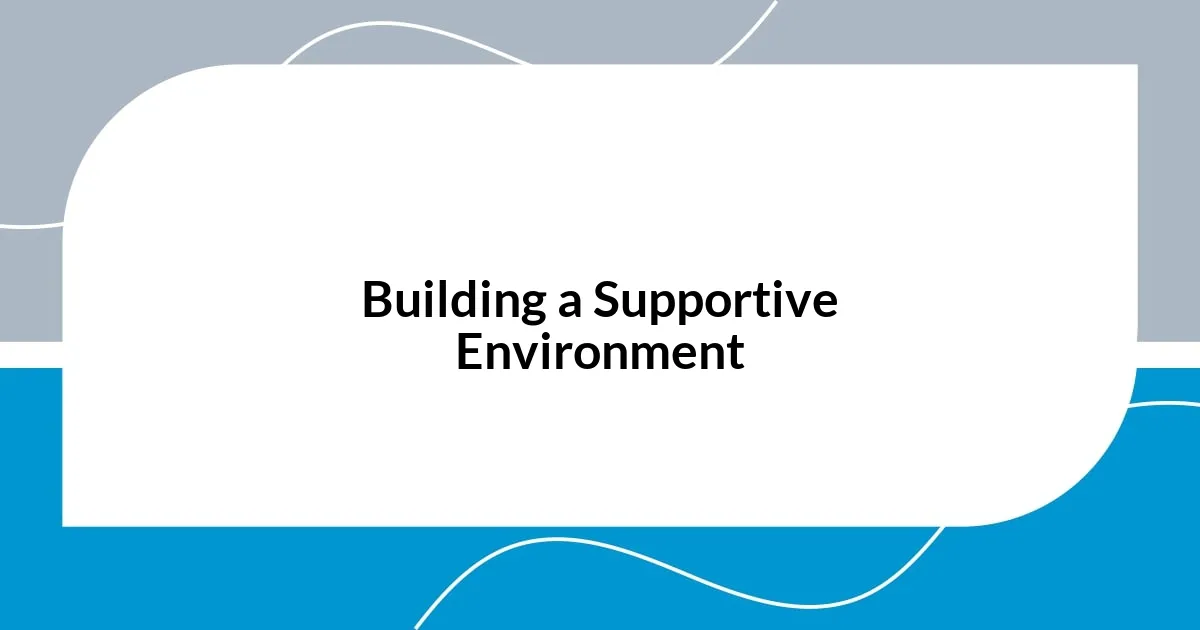
Building a Supportive Environment
Building a supportive environment is something I’ve discovered can significantly enhance my motivation levels. Whether it’s having friends who cheer me on or a workspace that inspires me, I notice a direct correlation between my surroundings and my drive. I remember transforming my home office; by adding motivational quotes and pictures of my loved ones, I instantly felt a boost in my creativity. It’s incredible how surrounding myself with positive reminders keeps me focused and energized.
I’ve also found that engaging with like-minded individuals plays a crucial role in maintaining motivation. When I’m part of a community that shares similar goals, the atmosphere becomes electric with inspiration. This reminds me of a book club I joined; discussing literature with passionate readers pushed me to dive deeper into my own reading list, and we held each other accountable. Isn’t it interesting how our environment and the people we choose to be around can act as catalysts for achievement?
Moreover, creating a space that’s free from distractions is equally important. I’ve experienced days where simply decluttering my desk had an immediate impact on my productivity. The clarity I felt when everything was in its place allowed my thoughts to flow freely. This makes me wonder: how often do we overlook the significance of our physical space? A well-structured environment can either hinder or propel us toward our goals.
| Supportive Environment Factors | Personal Impact |
|---|---|
| Positive Relationships | Encouragement and accountability boost motivation. |
| Inspiring Workspaces | Enhance creativity and focus through visual cues. |
| Community Engagement | Shared goals create a motivating and uplifting atmosphere. |
| Minimized Distractions | A clear space leads to clearer thoughts and better productivity. |
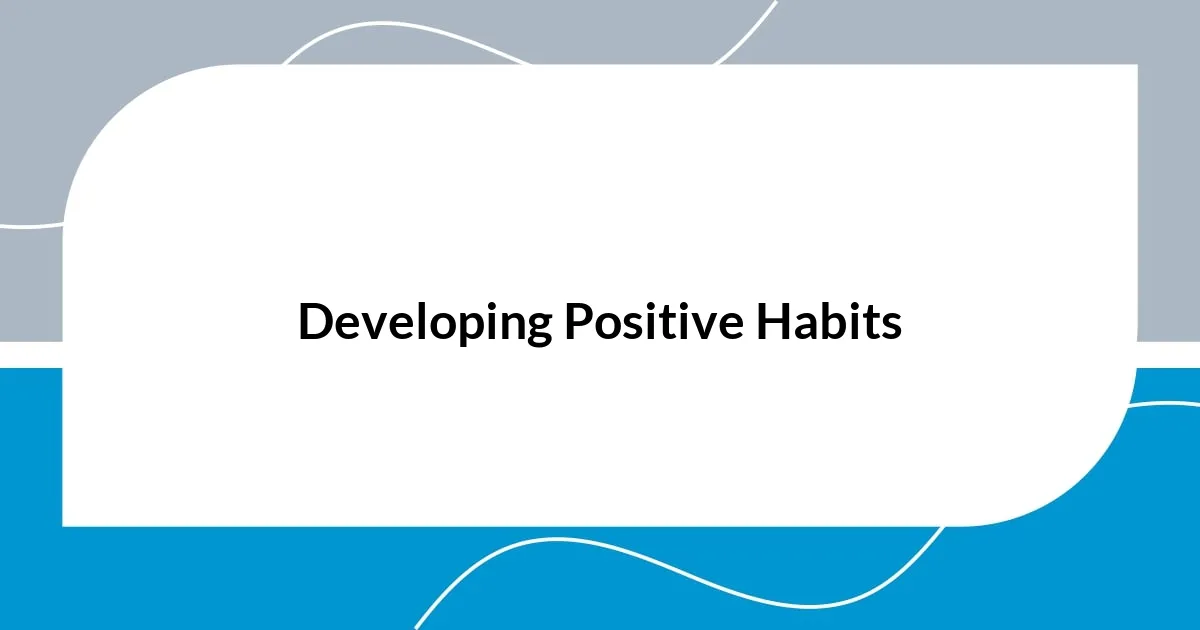
Developing Positive Habits
Developing positive habits has been essential in my journey toward sustained motivation. I remember a time when I struggled with consistency in exercising. It wasn’t until I committed to a morning routine—doing a brief workout before breakfast—that I noticed a shift. This small, manageable change eventually transformed into a daily ritual, fueling my motivation to tackle other goals. Have you ever felt that initial resistance transform into something enjoyable just because you stuck to a routine?
One thing I’ve discovered is the power of habit stacking. Now, instead of seeing old habits as obstacles, I connect new habits to ones I’m already practicing. For instance, I always enjoy my morning coffee, so I paired it with a short meditation session. The result? I’ve come to look forward to that peaceful moment, and it has been a game-changer for my mindset. How often do we overlook the potential of integrating new positive actions into what we already do?
Another emotional insight I’ve had involves monitoring my progress. Whenever I see how far I’ve come, it sparks a sense of pride that drives me further. I recently started using a habit tracker for my reading goals. Each time I check off a day, I feel a rush of accomplishment that motivates me to keep going. Isn’t it fascinating how such a simple act can fuel your commitment? Implementing strategies like these can turn the daunting task of forming habits into an exciting journey of personal growth.
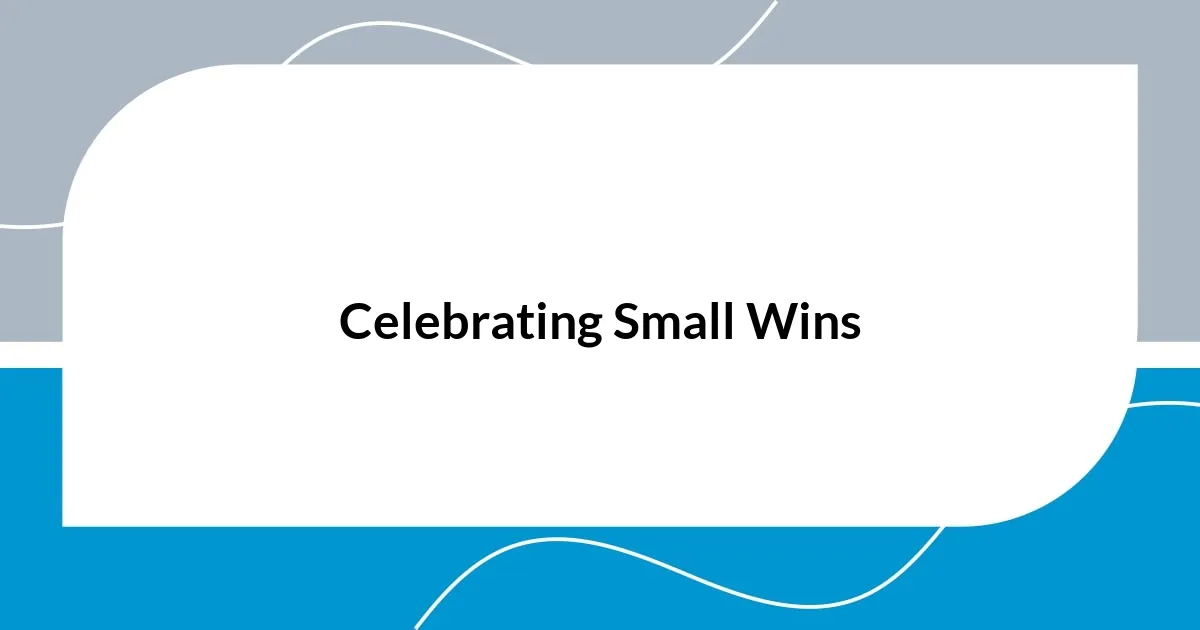
Celebrating Small Wins
Celebrating small wins is a practice that has fundamentally changed how I approach my goals. I vividly remember the time I completed my first chapter of a book I was writing. Instead of waiting for completion to celebrate, I shared my milestone with friends over coffee. Their cheers made me realize the importance of acknowledging these moments, no matter how small they seemed at the time. Have you ever paused to celebrate your achievements, even the minor ones?
I’ve noticed that when I take time to recognize these small victories, my motivation skyrockets. After every workout, I make it a point to note my achievements—whether it’s an increase in reps or just showing up consistently. It’s as if those moments of joy fuel my commitment to keep pushing forward. Isn’t it empowering to feel that sense of accomplishment, even from a simple workout?
What’s interesting is how this practice creates a positive feedback loop. Each small win brings a surge of happiness, which reinforces my desire to set and achieve new goals. The other day, I finished organizing my files and granted myself a rather indulgent treat—favorite ice cream, no guilt attached! That simple act of self-appreciation pushed me into the rest of my day with a spring in my step. Could it be that these celebrations serve not just as rewards but as pivotal motivators on our journey?
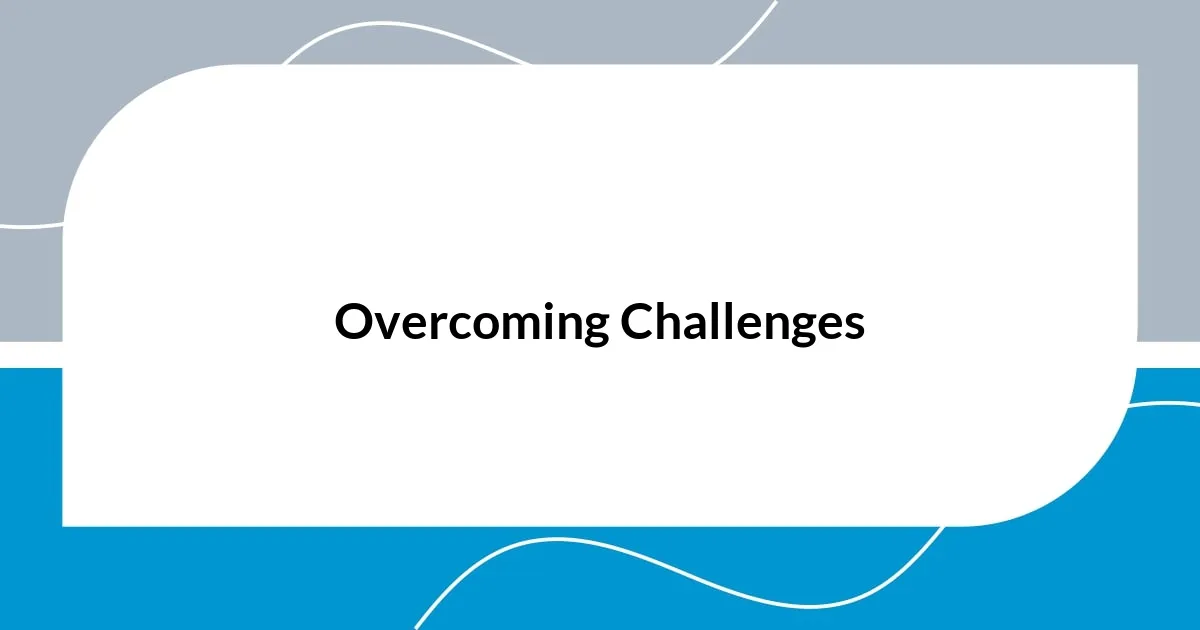
Overcoming Challenges
Overcoming challenges can often feel like an uphill battle, yet I’ve found that embracing discomfort leads to growth. Not long ago, I hit a rough patch while learning a new skill. Initially, the complexity made me anxious, but instead of shying away, I chose to lean into that discomfort. Have you ever noticed how facing something tough can actually unveil your strengths?
I’ve also discovered that reframing challenges as opportunities is a powerful mindset shift. For instance, when I faced setbacks in a project, I took a step back to evaluate the lessons within those frustrations. Instead of feeling defeated, I began asking myself what I could learn and how I could adapt. It’s incredible how altering my perspective allowed me to find solutions I hadn’t previously considered. Does this resonate with you?
There’s an undeniable strength in community when it comes to overcoming obstacles. I remember joining a group of peers facing similar challenges, and the support was transformative. Sharing experiences and insights not only bolstered my motivation but also turned isolated struggles into collective progress. How often do we forget that we don’t have to navigate challenges alone? It’s amazing what you can achieve when you lean on those around you.
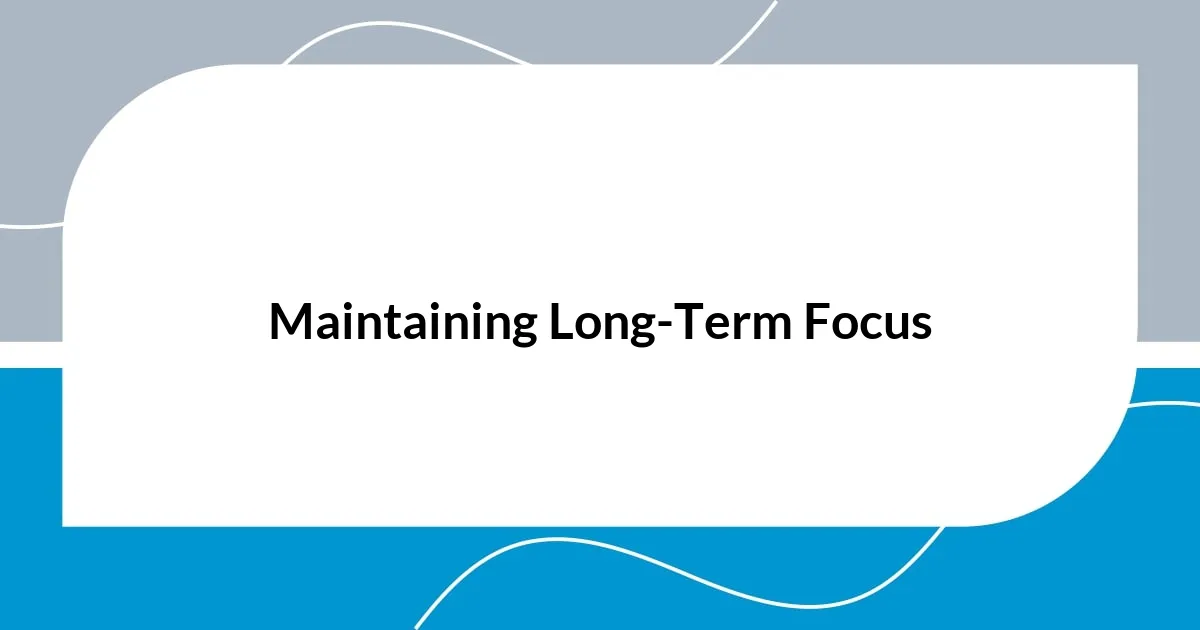
Maintaining Long-Term Focus
Maintaining long-term focus requires a blend of discipline and self-awareness. I’ve learned that setting clear, attainable milestones helps keep my eyes on the prize. For example, when I transitioned to a new job, I outlined monthly goals for myself—like mastering specific tasks or building relationships within the team. It became a game of small victories that reminded me why I started in the first place. Have you ever found that breaking down the journey into smaller parts makes the end goal seem closer?
Another aspect that helps me is regularly revisiting my ‘why’—the deeper purpose behind what I’m working towards. There have been times when I felt lost, questioning if my efforts were worth it. During those periods, I pulled out my journal and reflected on why I chose this path. Those moments of clarity not only renewed my determination but also reignited my passion. How often do we pause to reflect on our motivations?
I’ve also discovered that staying connected to my vision through visualization practices makes a significant difference. I remember attending a workshop where we were guided to picture our future selves achieving our dreams. This exercise was more than just a fleeting thought; it sparked a vivid image that I return to whenever my focus wavers. It’s fascinating how such mental imagery can be a powerful anchor, isn’t it? Keeping that image in mind makes the grind feel purposeful and ensures I remain steadfast in my long-term pursuits.